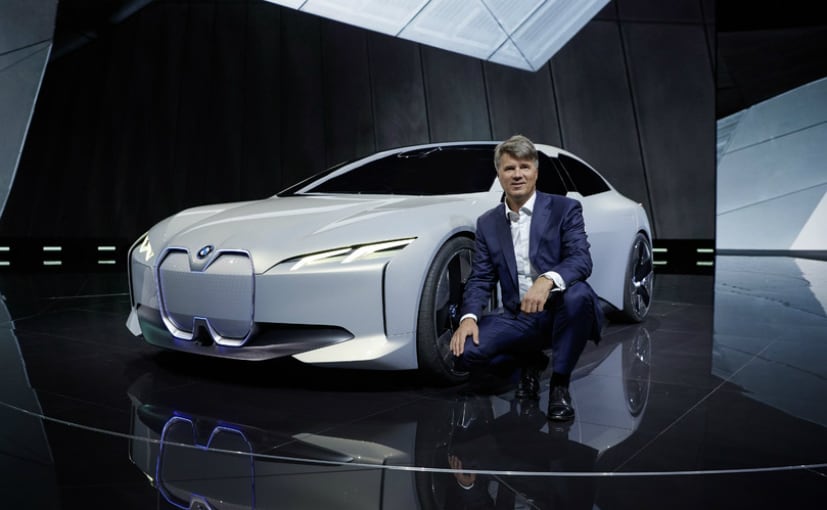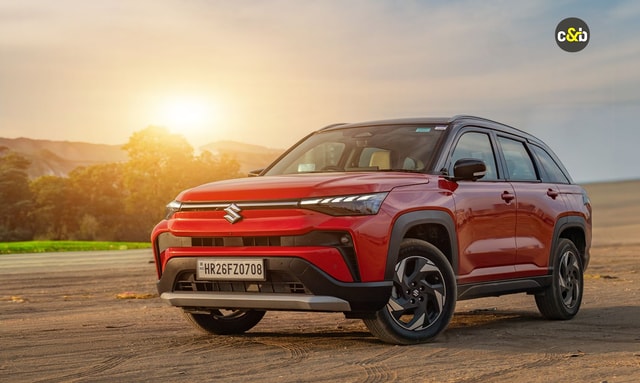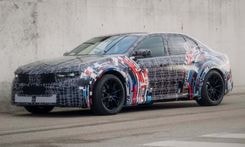BMW CEO Sticks To Return On Sales Goal Even With Electric Cars

BMW plans to stick to a goal for 8 to 10 percent return on sales at its automotive division, even with the arrival of less profitable electric cars, its chief executive said at the Frankfurt Auto Show on Tuesday. "We're sticking to our 8 to 10 percent goal and maintain this range, even when electric mobility becomes more widespread," Harald Krueger told journalists. Krueger also said that the share of BMW's sales in Europe accounted for by diesel engines had dropped to 69.3 percent from 74.3 percent, but that he saw no need for writedowns on the value of the cars in its leasing fleet.
Also Read: Mercedes-Benz EQA Electric Car Concept Unveiled
Daimler's Chief Executive Dieter Zetsche had said Mercedes-Benz will offer electric versions of all its models by 2022, converting its Smart city car brand to become fully electric. Speaking at the company's investor day in Sindelfingen, Germany, Daimler said it will offer at least 50 electrified versions of Mercedes-Benz passenger cars in hybrid and fully electric car variants. Because electric cars have a lower margin than combustion-engine cars, Daimler has set itself a more ambitious savings target. The company's Fit for Leadership 4.0 plan targets savings of 4 billion euros ($4.8 billion), Daimler said.
"We are still aiming for a 10 percent return on sales, but have to be prepared for a kind of transition, with a corridor of 8 to 10 percent," he said.
Also Read: Carmakers Face Electric Reality As Combustion Engine Outlook Dims
As part of the cost savings plan, Daimler wants to save 1 billion euros from fixed costs, and another billion from research and development and capital expenditure. The remainder would come mainly from product costs.
Daimler said that by 2025, the purchasing cost of electric cars would likely reach parity with combustion equivalents, which could accelerate migration to battery powered vehicles. Electric cars are currently more expensive than combustion-engine cars because of battery costs.
(This story has not been edited by NDTV staff and is auto-generated from a syndicated feed.)
Latest News
 Preetam Bora | Feb 26, 2026Second-Generation Ducati DesertX Unveiled: All You Need To KnowThe new DesertX V2 comes five years after the first-generation model and will be launched in India by the end of this year. It gets an all-new 890 cc, V2 engine, new frame, updated suspension and electronics package.1 min read
Preetam Bora | Feb 26, 2026Second-Generation Ducati DesertX Unveiled: All You Need To KnowThe new DesertX V2 comes five years after the first-generation model and will be launched in India by the end of this year. It gets an all-new 890 cc, V2 engine, new frame, updated suspension and electronics package.1 min read car&bike Team | Feb 26, 2026Mahindra XEV 9S Gains A New Custom Drive ModeThis new mode is limited to the Pack Three variants equipped with adaptive dampers.1 min read
car&bike Team | Feb 26, 2026Mahindra XEV 9S Gains A New Custom Drive ModeThis new mode is limited to the Pack Three variants equipped with adaptive dampers.1 min read car&bike Team | Feb 26, 2026JSW Motors Teases Its First SUV For India; To Be Based On Jetour T2The JSW Group is looking to enter the Indian automobile sector under its own name while also operating the JSW MG Motor India joint venture.2 mins read
car&bike Team | Feb 26, 2026JSW Motors Teases Its First SUV For India; To Be Based On Jetour T2The JSW Group is looking to enter the Indian automobile sector under its own name while also operating the JSW MG Motor India joint venture.2 mins read car&bike Team | Feb 26, 2026Next Mahindra Electric SUV Launch Confirmed For 2027Mahindra has confirmed that the BO7, production version of the BE.07 concept will arrive in CY27.2 mins read
car&bike Team | Feb 26, 2026Next Mahindra Electric SUV Launch Confirmed For 2027Mahindra has confirmed that the BO7, production version of the BE.07 concept will arrive in CY27.2 mins read car&bike Team | Feb 26, 2026New Bajaj 125-250cc Brand To Be Launched SoonRajiv Bajaj, Managing Director of Bajaj Auto, has said that a new 125-250 cc Bajaj motorcycle brand will be launched in this calendar year.1 min read
car&bike Team | Feb 26, 2026New Bajaj 125-250cc Brand To Be Launched SoonRajiv Bajaj, Managing Director of Bajaj Auto, has said that a new 125-250 cc Bajaj motorcycle brand will be launched in this calendar year.1 min read Jaiveer Mehra | Feb 26, 2026New Renault Duster India Launch On March 17Unveiled in India last month, the new Duster will arrive with a pair of turbo-petrol engine options, with a strong hybrid to join the line-up later in the year.2 mins read
Jaiveer Mehra | Feb 26, 2026New Renault Duster India Launch On March 17Unveiled in India last month, the new Duster will arrive with a pair of turbo-petrol engine options, with a strong hybrid to join the line-up later in the year.2 mins read
 Preetam Bora | Feb 24, 2026Hero Destini 110 Review: Simplicity, RefinedThe Hero Destini 110 is a no-nonsense commuter that is simple, comfortable and above all, fuel efficient. In 2026, when buyers are spoilt for choice, is it good enough to consider?1 min read
Preetam Bora | Feb 24, 2026Hero Destini 110 Review: Simplicity, RefinedThe Hero Destini 110 is a no-nonsense commuter that is simple, comfortable and above all, fuel efficient. In 2026, when buyers are spoilt for choice, is it good enough to consider?1 min read Preetam Bora | Feb 23, 2026TVS Apache RTX Road Test Review: Redefining the Entry-Level ADVAfter spending some time with the TVS Apache RTX in traffic, the daily commute, as well as on open highways, one thing becomes clear: the RTX is trying to redefine the entry-level ADV segment. But is it without fault?1 min read
Preetam Bora | Feb 23, 2026TVS Apache RTX Road Test Review: Redefining the Entry-Level ADVAfter spending some time with the TVS Apache RTX in traffic, the daily commute, as well as on open highways, one thing becomes clear: the RTX is trying to redefine the entry-level ADV segment. But is it without fault?1 min read Girish Karkera | Feb 20, 2026Road Test: 2025 VinFast VF7 AWD Sky InfinityFlagship all-electric SUV from the Vietnamese car maker gets most of the basics right.1 min read
Girish Karkera | Feb 20, 2026Road Test: 2025 VinFast VF7 AWD Sky InfinityFlagship all-electric SUV from the Vietnamese car maker gets most of the basics right.1 min read Jaiveer Mehra | Feb 18, 2026New BMW X3 30 Vs Mercedes-Benz GLC 300: Midsize Luxury SUV FaceoffWith the new X3 30, BMW has a direct competitor to the petrol GLC 300, but which is the luxury SUV for you?1 min read
Jaiveer Mehra | Feb 18, 2026New BMW X3 30 Vs Mercedes-Benz GLC 300: Midsize Luxury SUV FaceoffWith the new X3 30, BMW has a direct competitor to the petrol GLC 300, but which is the luxury SUV for you?1 min read Jafar Rizvi | Feb 15, 2026Maruti Suzuki Victoris: Long-Term Review - Report 1The Victoris is Maruti’s latest offering for the Indian market, and after spending some time with it, here are a few early impressions.1 min read
Jafar Rizvi | Feb 15, 2026Maruti Suzuki Victoris: Long-Term Review - Report 1The Victoris is Maruti’s latest offering for the Indian market, and after spending some time with it, here are a few early impressions.1 min read















































































































































